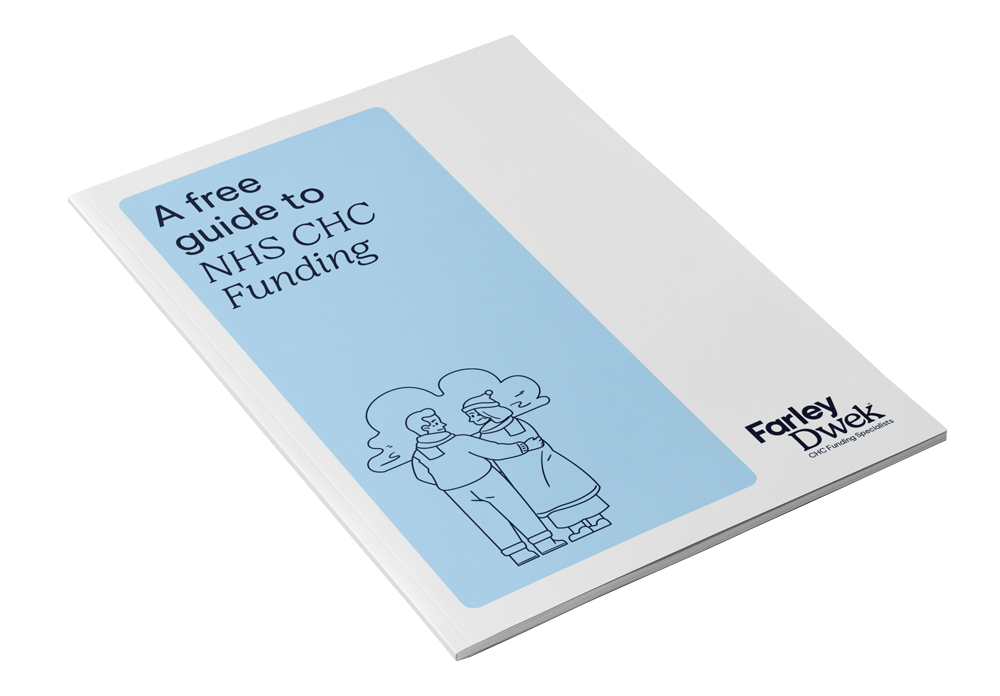MDT Advocacy Service
Expert support when you need it most
The Full Assessment for CHC Funding can be an emotional and overwhelming experience. Thankfully, our Nurse Assessors can provide skilled advocacy, often at very short notice.
After the screening Checklist is the Full Assessment. This considers the same factors, but in much more detail, using the Decision Support Tool.
The Full Assessment is undertaken by a multidisciplinary team (“MDT”). Usually, this simply means a Nurse Assessor working for the NHS and a Social Worker from the Local Authority.
The MDT often feels very intimidating, especially if you have never gone through the process before. Having an experienced advocate by your side – someone who knows what should and shouldn’t happen at each stage – can make all the difference in ensuring the assessment is fair and robust.
Our approach…
The main steps involved in our MDT Advocacy Service:
- Arranging a virtual meeting with one of our specialist CHC Nurse Assessors to discuss your relative’s health and social care needs.
- Arranging our Nurse Assessor’s remote attendance at the MDT to support you and ensure the assessment is robust, fair and procedurally correct.
- Providing you with a follow-up report.
- Letting you know our thoughts on appeal prospects, if the outcome is negative.

FAQs
MDT stands for Multidisciplinary Team.
MDT or Multidisciplinary Team relates to the healthcare professionals involved in decision making regarding a patient’s care requirements and treatment.
Read our blog for more information about what an MDT meeting is.
MDT assessments can feel intimidating and confusing. An experienced advocate can guide the process, correct misunderstandings in real time, and ensure your relative’s health and social needs are fully and fairly represented.
The MDT assessment is a crucial part of the CHC process. Securing CHC funding at this early stage can save you a lot of time, energy and expense. Having professional representation at the meeting can make a real difference to the outcome.
At Farley Dwek, our MDT Advocacy Service provides families with expert support from a qualified CHC Nurse Assessor who understands the CHC eligibility criteria and assessment process inside out.
We help ensure:
- The patient’s needs are explained clearly
- The right questions are asked
- The levels of need are assessed fairly
- The process is followed correctly
- You have an expert to support and advocate for you
Our MDT Advocacy Service is designed to give families peace of mind at a stressful time and maximise prospects of success.
- Initial remote consultation with a specialist Nurse Assessor
- The Nurse Assessor attends the NHS/Local Authority MDT meeting remotely or in person
- You receive a follow-up report summarising the meeting and next steps
- Expert advice on appealing the outcome if funding is not awarded
Yes, you can download our free guide explaining CHC funding eligibility and the steps involved. A pre-service call with us helps assess whether it’s likely worth proceeding.
We operate a pay-as-you-go model, meaning you pay for each stage as you go. We offer a free initial consultation, and there’s no hidden commitment up front.
MDT advocacy can be arranged at short notice. Providing we have a nurse available, we can often provide support with less than 48-hours’ notice.
Yes, NHS continuing healthcare eligibility can be pursued independently, and the free guide is designed to help with that. However, many clients find the process complex and emotionally exhausting. Having specialist legal and clinical support can significantly improve the chance of success.
Whether the person being assessed attends the MDT usually depends on their ability to understand and participate in the process. For example, a person suffering from advanced dementia is unlikely to attend. In these cases, they will usually be represented by a friend or family member.
If you are the patient, or you are acting as a representative for someone who can’t participate in the assessment themselves, we always recommend that you attend. Being present allows you to:
- Offer additional information
- Clarify misunderstandings
- Challenge assumptions about needs
- Ensure your voice is heard
Even if the meeting is held virtually (online), you should be invited to participate and share your perspective. If you weren’t told about the meeting, this may amount to an abuse of process and could be grounds for appeal.
If the assessment does not result in CHC funding, one of our experienced Case Managers will review the outcome and advise on appeal prospects. This may lead to additional support with an appeal.
After the MDT meeting, the recommendation is sent to the local Integrated Care Board (ICB) for ratification. While the ICB is responsible for making the final decision, it should, in all but exceptional circumstances, accept the recommendation of the MDT.
If CHC funding is awarded, the NHS will cover all care home fees or home care costs, including accommodation, nursing care and medical support.
If funding is denied, you’ll receive a formal outcome letter explaining the decision. You can appeal this outcome through the local resolution process and, if necessary, escalate it to an Independent Review Panel.
You should usually hear back within a few weeks of the MDT, although timelines can vary.




